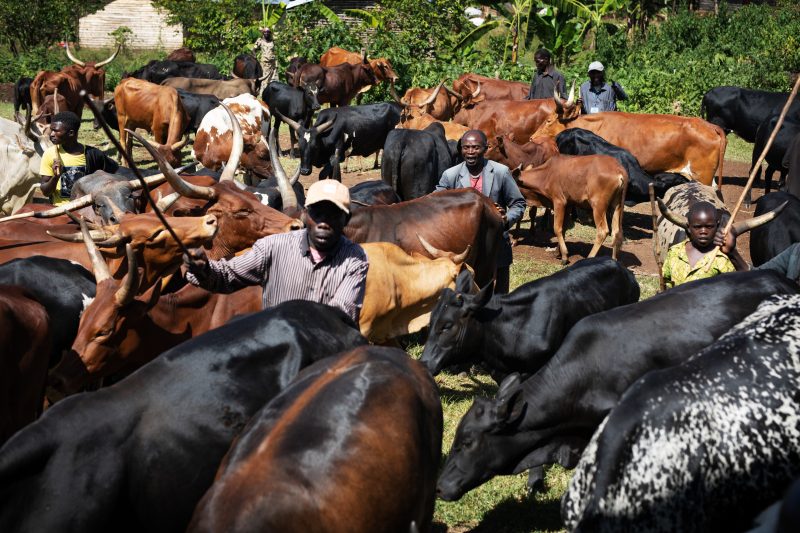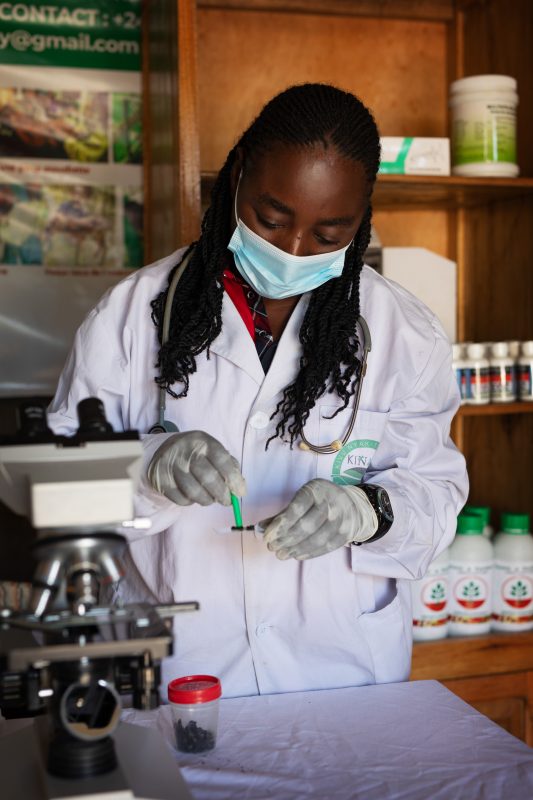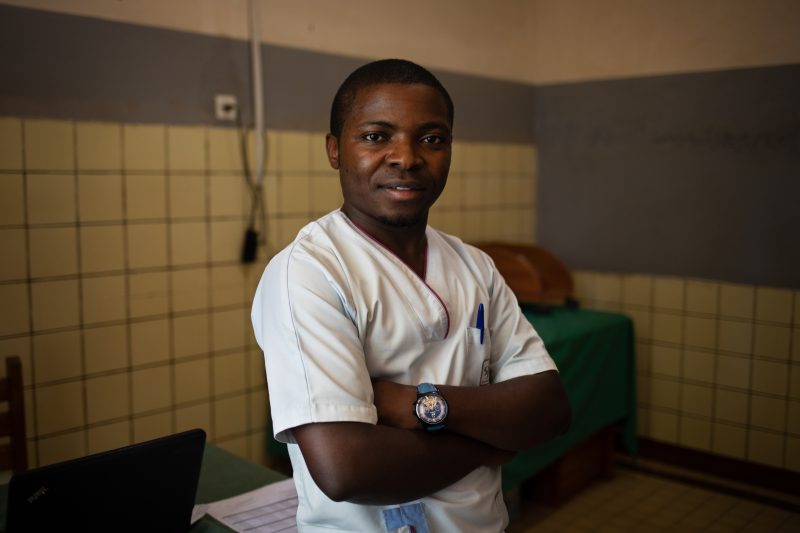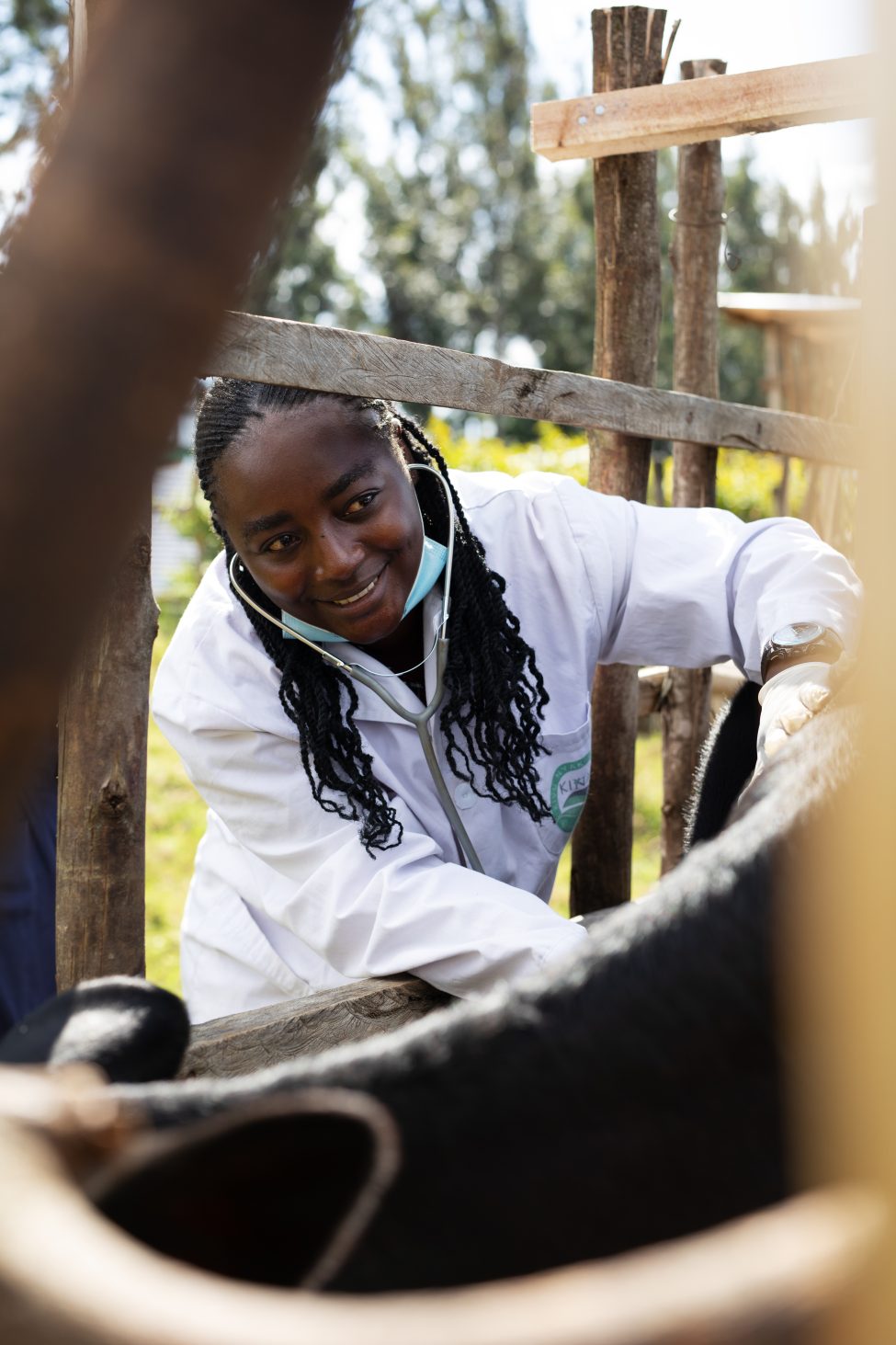In South Kivu, in the east of the Democratic Republic of Congo, a large proportion of the population makes a living from livestock keeping and is in close daily contact with domestic or wild animals. As a local proverb says, “you can only relax if you can hear your cow breathing”. So there is nothing unusual about families who sleep in the same room as their goats or feed them from pots and pans that are then used to prepare meals for the whole family.
Such proximity entails significant health risks, however, of which the population is not aware. The danger of contracting a zoonosis, a disease transmitted from animals to humans, is very real. Whereas Ebola and Covid-19 often hit the headlines, other more common zoonotic diseases such as tuberculosis, tick-borne diseases and rabies also need to be taken seriously. “We have many cases of brucellosis in the region at present, which causes infertility in women,” says Dr Safi Ngomora, a young vet based in the small town of Katana. This zoonosis is transmitted through the consumption of contaminated milk, whereas other diseases are caught through direct contact with the sick animal.
Since mid-2022, the One Health project has been tackling the problem of zoonoses around the eastern sector of Kahuzi-Biega National Park. Set up by Vétérinaires Sans Frontières Belgium, Médecins du Monde Belgique and Action pour le Développement des Milieux Ruraux, three NGOs specialising in animal health, human health and the environment respectively, the project aims to decompartmentalise the three health systems.
Zoonoses, a little-known and underestimated danger in South Kivu

In South Kivu, a large proportion of the population keeps livestock. Due to a lack of space and the insecurity they experience, many people keep their animals in their homes, increasing the risk of disease transmission. © Thomas Cytrynowicz
In constant contact with livestock keepers and their animals, Dr Safi Ngomora is well aware of the zoonotic risks and her mission as a vet to prevent them from spreading: “While I am doing my work in the field, I may be infected at any time by handling animals. One of the main roles of vets in South Kivu is to raise awareness of zoonotic diseases among local populations. This is especially important because many people live and sleep under the same roof as their animals.”
However, only five zoonotic diseases are currently under epidemiological surveillance with immediate notification of cases in the Democratic Republic of Congo. This list does not reflect the reality in South Kivu. For this reason, Vétérinaires Sans Frontières Belgium and its partners are campaigning for the health authorities to recognise and adopt a reference base of 27 zoonoses.
But this is far from the only problem: above all, the human and animal health systems are hindered by a lack of staff and resources. To strengthen animal health services, Vétérinaires Sans Frontières Belgium has provided support to set up four veterinary practices and supplied the equipment required to diagnose zoonotic diseases. In a region where there are almost as many livestock as there are inhabitants, however, there are not enough vets to cope with the task at hand. This is why the NGO has also trained and equipped 172 animal health workers, who are actively involved in epidemiological surveillance and awareness-raising work in their communities.
When awareness raising runs up against vulnerability

Dr Safi Ngomora, a private vet in Katana, is preparing a sample at her practice. Her new microscope permits her to analyse it without calling in the help of the laboratory in Lwiro or Goma. © Thomas Cytrynowicz
Thanks to support from the One Health project, Dr Ngomora has been able to move into a larger practice in Katana, and she now has a microscope. In her “mini laboratory”, it takes her less than 24 hours to identify the disease suffered by an animal examined by one of the 72 animal health workers she supervises. “This saves us valuable time. I used to have to call on the laboratory in Lwiro or Goma. That sometimes took several days”, she explains. This is a major step forward in the rapid diagnosis of animal diseases and the reporting of potential cases of zoonoses among the livestock keepers who own them.
Dr Ngomora and her animal health workers use educational poster boxes provided by Vétérinaires Sans Frontières Belgium to alert livestock keepers to the telltale signs of zoonotic diseases and advise them on how to avoid infection: avoid sharing your living areas or kitchen with animals, wash your hands well after touching an animal, don’t eat meat from animals found dead, and so on. But the great precarity in which the local population lives, especially the Indigenous population, does not make the task any easier. “They are so vulnerable that they say to us: ‘We do understand, but what are you going to give us instead?’”, the young vet tells us.
To help the population put an end to these risky practices, the project offers alternatives: fast-growing tree seedlings and, for the most vulnerable, goats. In a few years, these trees will mature so that local people can use them for firewood and as a building material, instead of chopping down trees in the park. By then, the goats will have given birth to many kids, and the herd will be providing daily milk and manure to stimulate crop growth. The network of vets that has been set up will ensure that they remain healthy while raising awareness among new livestock keepers about zoonoses and how to keep them at bay.
“We all do our own thing”: health systems are too compartmentalised
To fight zoonoses effectively, however, vets cannot act alone. As the One Health approach explains, the health of humans, animals and their environment are closely linked, and so close collaboration is required between professionals in all these sectors.

As Dr Bienfait Akonkwa, the head of internal medicine at Katana Hospital, tells us: “Zoonoses tend to get a bit forgotten in the hospital.” © Thomas Cytrynowicz
Among human doctors, it is far from automatic to think in terms of zoonoses, as Dr Bienfait Akonkwa tells us: “Zoonoses tend to get a bit forgotten in the hospital. We only think about them when we have already ruled out all other human pathologies”, admits the head of internal medicine at Formulac Hospital in Katana. Recently trained in the One Health concept as part of the project, the young man has become aware of the compartmentalisation of health services: “We all do our own thing”, he explains. “I see a patient, I treat them and they go home. But maybe it was their cow that infected them, and it is still in their home. So the problem hasn’t really been solved. I don’t call the vet, though. And if you only focus on one aspect, you can’t solve the problem.”
Towards an integrated contingency and response plan
For the past few weeks, Dr Akonkwa has been in contact with Dr Ngomora. The doctor and vet belong to the same One Health committee, set up as part of our project in Katana, alongside animal health workers, environmentalists and various community representatives. This is a first step towards a sorely needed, integrated health system. “One Health is a crucial approach to avoid cacophony between different health systems and ensure comprehensive care that will enable us to respond more effectively.”
However, there is still a long way to go in South Kivu, where they are almost starting from scratch. Some experts fear that an epidemic in the region would be an automatic catastrophe because there is no response plan that integrates human, animal and environmental health. Currently, there are no clear guidelines for how communities should deal with patients at risk and how to report the information before a sick person arrives at the hospital. In fact, though, this person could infect many others on their way to hospital… An integrated system would make it possible to “break the chain” and prevent a disease from developing into an epidemic. For example, this approach could have helped prevent the Ebola epidemic from spreading as much as it did in the DRC.
Developing a contingency and response plan is precisely one of the objectives set by the One Health project, along with strengthening the National Health Information System and implementing a joint monitoring strategy. This is a long-term undertaking. Now that the first foundations have been laid, work can continue until the project ends in 2026.
 The activities of the One Health project are being carried out with the support of Belgian development cooperation. It is a unique pilot experiment implemented by Vétérinaires Sans Frontières, Médecins du Monde and local partner Action pour le Développement des Milieux Ruraux. Each NGO is specialised in one of the three health sectors: animal, human or environmental. Find out more about the project and its background.
The activities of the One Health project are being carried out with the support of Belgian development cooperation. It is a unique pilot experiment implemented by Vétérinaires Sans Frontières, Médecins du Monde and local partner Action pour le Développement des Milieux Ruraux. Each NGO is specialised in one of the three health sectors: animal, human or environmental. Find out more about the project and its background.

